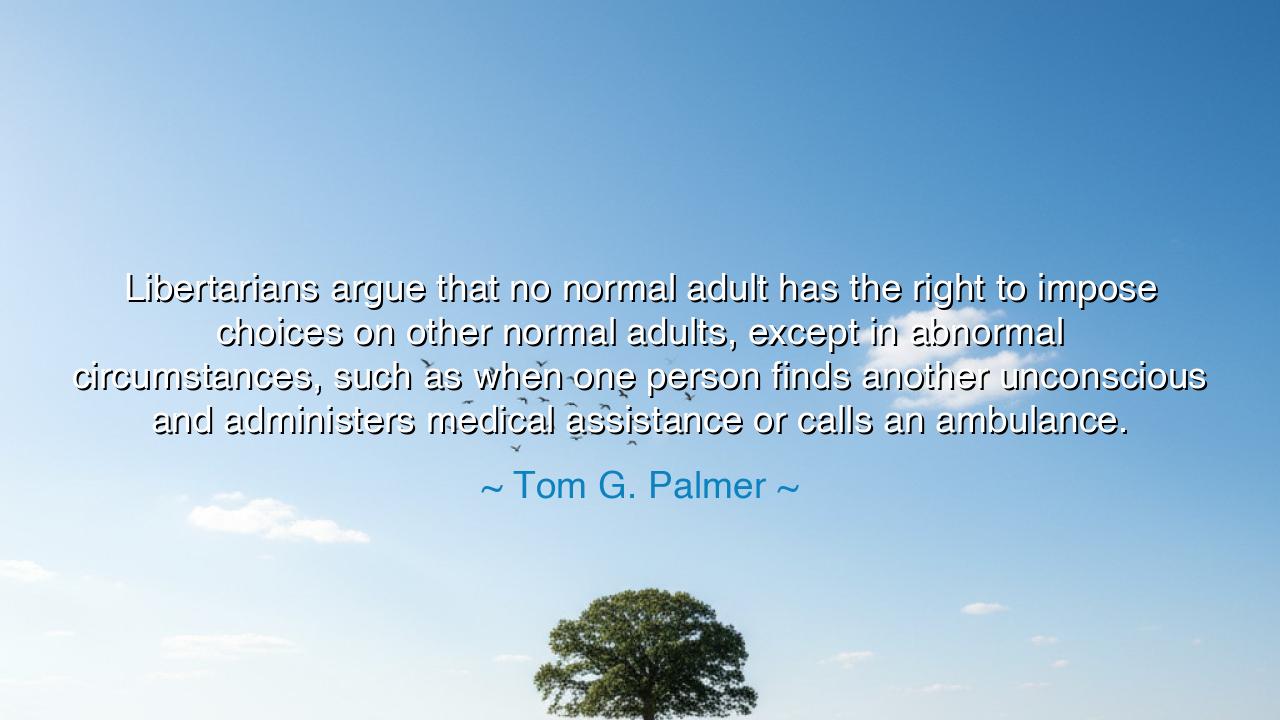
Libertarians argue that no normal adult has the right to impose
Libertarians argue that no normal adult has the right to impose choices on other normal adults, except in abnormal circumstances, such as when one person finds another unconscious and administers medical assistance or calls an ambulance.






In the words of Tom G. Palmer we hear the echo of a philosophy both ancient and modern: “Libertarians argue that no normal adult has the right to impose choices on other normal adults, except in abnormal circumstances, such as when one person finds another unconscious and administers medical assistance or calls an ambulance.” Here is not merely a statement of politics, but a profound reflection on the dignity of the human being, the sacredness of freedom, and the limits of authority.
At the heart of this teaching is the sanctity of choice. To be human is to bear the burden and the gift of deciding one’s own path. When one adult presumes to govern the life of another, without consent and without cause, the divine spark of liberty is dimmed. Palmer reminds us that no matter how wise or strong we may think ourselves, we are not masters of our neighbor’s soul. Each person has a right to chart their own course, to reap the harvest of their decisions, whether bitter or sweet.
Yet he acknowledges the exception of abnormal circumstances. For liberty is not license to abandon compassion. If one lies unconscious in the street, unable to act for themselves, then the moral duty of another is clear: render aid, summon help, preserve life. This is not an imposition upon liberty, but the fulfillment of a deeper law, the law of humanity itself. In such moments, respect for freedom means protecting it until the fallen one can rise again to exercise it. Here we see the balance between freedom and responsibility, between independence and solidarity.
History gives us vivid examples. Consider the Stoics of ancient Rome, who taught that each man is sovereign over his own will, yet they also held that one must act to aid others in distress, for we are all bound together in a common humanity. Or recall the American Revolution, where the colonists resisted the imposition of laws and taxes by a distant crown, declaring that free men should not have their choices imposed by force. Yet these same men bound themselves to one another in mutual defense, recognizing that liberty thrives best in community, not isolation.
The deeper meaning of Palmer’s words is that the line between rightful freedom and wrongful imposition must be drawn with care. Too often in history, rulers and zealots have claimed to know what is best for others, enforcing their visions through laws, decrees, and violence. From the Inquisitions to totalitarian regimes, the story is the same: under the guise of guidance, freedom is extinguished. Palmer’s libertarian principle warns against this eternal temptation: that to preserve the dignity of all, one must resist the urge to control what does not belong to oneself.
But his words also protect against the opposite error: neglecting one another entirely. To ignore the man who lies dying on the roadside, saying, “It is his choice, not mine,” is not liberty but cruelty. True respect for freedom requires that we intervene only when freedom cannot be exercised, that we act not to dominate but to restore. In this lies the nobility of the exception, the recognition that compassion does not destroy liberty, but safeguards it.
The lesson is plain for us all. Let each of us honor the sovereignty of others. Do not impose your will where it is not sought. Do not coerce, do not belittle, do not claim mastery over the choices of another. Yet also, be ready to act when another cannot act for themselves—whether through illness, weakness, or peril. Build a society where liberty is not a weapon against others, but a shared covenant of dignity and responsibility.
Thus Palmer’s words, though framed in the discourse of libertarians, carry a universal truth: that freedom is the highest trust among human beings. It demands restraint, it demands compassion, and it demands respect. If we live by it, we preserve the flame of liberty not only for ourselves, but for generations yet to come.






AAdministratorAdministrator
Welcome, honored guests. Please leave a comment, we will respond soon